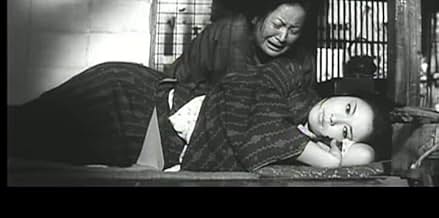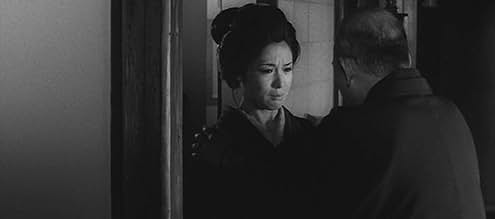IMDb-BEWERTUNG
7,7/10
741
IHRE BEWERTUNG
Füge eine Handlung in deiner Sprache hinzuOn the eve of the Russo-Japanese war at the beginning of the 20th century, small-town girl Okane has married an old wealthy man to escape a life of poverty.On the eve of the Russo-Japanese war at the beginning of the 20th century, small-town girl Okane has married an old wealthy man to escape a life of poverty.On the eve of the Russo-Japanese war at the beginning of the 20th century, small-town girl Okane has married an old wealthy man to escape a life of poverty.
- Regie
- Drehbuch
- Hauptbesetzung
- Auszeichnungen
- 3 wins total
Empfohlene Bewertungen
Ayako Wakao was sold to a rich kimono merchant, who lavished everything on her. Now he's dead. She has returned to her village, where everyone despises her because of her past, except for Takahiro Tamura. They fall into lust and common-law marriage because his mother doesn't approve. He's the role-model soldier for village, and the Russo-Japanese War is about to begin. When he gets sent off to the assault on Port Arthur, the village goes back to treating her like dirt, until word comes that Tamura was injured, is in hospital, and will be given a week's leave She doesn't want him to go.
It's a movie that combines two two Japanese elements that look absolutely bonkers to a foreigner. First, of course, is the way everyone salutes the Emperor and is thrilled that Tamura has a chance to die; one of the characters says that a real hero is one who dies. The other is the sort of obsessive love that makes someone mutilate the object of their desire.
Well, it baffles me, if not all foreigners. Some people are weird.
It's stunningly performed and directed by Yasuzô Masumura, a leading light of the Japanese New Wave. As someone who decried Old Japan and New Japan, I think this expresses his disapproval of both.
It's a movie that combines two two Japanese elements that look absolutely bonkers to a foreigner. First, of course, is the way everyone salutes the Emperor and is thrilled that Tamura has a chance to die; one of the characters says that a real hero is one who dies. The other is the sort of obsessive love that makes someone mutilate the object of their desire.
Well, it baffles me, if not all foreigners. Some people are weird.
It's stunningly performed and directed by Yasuzô Masumura, a leading light of the Japanese New Wave. As someone who decried Old Japan and New Japan, I think this expresses his disapproval of both.
This is a desperate story of how love can drive people to extremes to hold on to the ones they love and keep them safe. It's also a condemnation of Japanese militarism and small town bigotry. The violence when it comes is quite shocking but wholly appropriate to the story. It's one of the most real love stories you'll ever see on film.
A wild and fascinating melodrama full of passion, love, war, and hate.
Japan at the beginning of the 20th century. Okane, a beautiful girl from a poor family, must serve as a mistress to a much older rich man. When he and her father die, the young woman returns with her mother to their native village. The locals despise them because of Okane's past, the young woman meets them with arrogance and haughty behavior. But then everything changes when her mother dies and the handsome Seisaku, a young man who is regarded as a model soldier and the son-in-law of their dreams by the villagers, helps her in this difficult situation. The two fall in love and marry against the spite of the whole village (their passionate sexual relationship is emphasized during the whole film), but then Seisaku has to go to war against the Russians and their world falls apart...
Violent and passionate, wonderfully photographed and played (especially by the beautiful Ayako Wakao), full of hot tears but nevertheless never sentimentalist or kitschy, this Japanese film is a real discovery.
Japan at the beginning of the 20th century. Okane, a beautiful girl from a poor family, must serve as a mistress to a much older rich man. When he and her father die, the young woman returns with her mother to their native village. The locals despise them because of Okane's past, the young woman meets them with arrogance and haughty behavior. But then everything changes when her mother dies and the handsome Seisaku, a young man who is regarded as a model soldier and the son-in-law of their dreams by the villagers, helps her in this difficult situation. The two fall in love and marry against the spite of the whole village (their passionate sexual relationship is emphasized during the whole film), but then Seisaku has to go to war against the Russians and their world falls apart...
Violent and passionate, wonderfully photographed and played (especially by the beautiful Ayako Wakao), full of hot tears but nevertheless never sentimentalist or kitschy, this Japanese film is a real discovery.
An absolutely Masterpiece from a great underrated director, who worked as assistant of Mizoguchi and his films, like those of his master's, are contemplative, although not such slow. Seisaku's Wife tells a rich and impressive story about an inevitable love in contradiction to military honor. You can see desperate life instinct in the age of imperial deadly values. This dichotomy, of course, is not unfamiliar in Japanese classic cinema: Naruse's Floating Clouds and, even more, Suzuki's Story of a Prostitute (also made in 1965) showed the same contradiction. But I found Masumura's movie stronger: Majestic pictures, simple but splendid music, and excellent performances.
It is strongly recommended, especially if you love infinite golden heritage of Japanese studio cinema.
I watched Yasuzo Masumura's Red Angel a few nights ago, and was really impressed, so decided to watch another film of his that also starred Ayako Wakao in the lead role. Both it and Seisaku's Wife are perhaps comparable in the sense that they focus on love during wartime, and much like life, show it to be no party, no disco, nor any kind of fooling around. But Red Angel's grimness was unrelenting and genuinely shocking, and Seisaku's Wife feels a little more melodramatic in a way I couldn't quite click with. It's very repetitive, and even though I do agree with what I think the movie is criticizing, I just got so worn down by how much it seems to repeat itself.
It might be the point - the endless (and annoying) gossiping and two lead characters who keep feeling stuck by the terrible and backward small town they live in. I don't know if it fully came together, though, and the more shocking scenes feel jarring in a way that might've also been intentional, but still didn't hit me the way I think they were supposed to. It's a bit of a mess, but I think it's well-shot and mostly well-acted, and also given that some of the frustrations I felt are probably the point (doesn't mean I liked feeling that way, nor found it the "right" amount of frustrating), I can't exactly call it bad. I'll absolutely never watch it again, though.
It might be the point - the endless (and annoying) gossiping and two lead characters who keep feeling stuck by the terrible and backward small town they live in. I don't know if it fully came together, though, and the more shocking scenes feel jarring in a way that might've also been intentional, but still didn't hit me the way I think they were supposed to. It's a bit of a mess, but I think it's well-shot and mostly well-acted, and also given that some of the frustrations I felt are probably the point (doesn't mean I liked feeling that way, nor found it the "right" amount of frustrating), I can't exactly call it bad. I'll absolutely never watch it again, though.
Wusstest du schon
- VerbindungenRemake of Seisaku no tsuma (1924)
Top-Auswahl
Melde dich zum Bewerten an und greife auf die Watchlist für personalisierte Empfehlungen zu.
Details
- Laufzeit1 Stunde 33 Minuten
- Farbe
- Sound-Mix
- Seitenverhältnis
- 2.35 : 1
Zu dieser Seite beitragen
Bearbeitung vorschlagen oder fehlenden Inhalt hinzufügen

Oberste Lücke
By what name was The Wife of Seisaku (1965) officially released in India in English?
Antwort


















